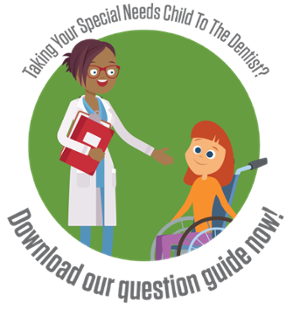By Astrid Graterol on Oct 22, 2019 @ 12:26 PM
Children with special needs face unique challenges in their lives relating to their physical, mental, and oral health. However, similar to any other child, special needs children need proper oral health care. According to the Maternal and Child Health Bureau, special needs children are more likely to have unmet dental problems than other children. This may be due to symptoms of their health condition, diet, oral sensitivity, or trouble eating. Many times, dental care is put last on the list of priorities because regular oral hygiene practices and visits to the dentist can be difficult. Here are a few common dental concerns that can lead to complications of a child’s oral health:
Common Dental Concerns
- GERD (Gastro-Esophageal Reflux Disease): GERD can cause a child’s mouth to be acidic, and as a result, can wear down the teeth. A dentist may prescribe pastes to help prevent teeth damage from the acid or an antacid if they are experiencing other physical symptoms.
- Food Pouching: Some children will hold food in their mouth or cheeks much longer than usual (also known as, food pouching). This creates an environment for bacteria that cause cavities to grow.
- Grinding (bruxism): Children may grind or gnash their teeth while sleeping or during the day. Over time, grinding can damage teeth. This is common and most children outgrow the habit. Treatments are available if it becomes a problem.
- Bad breath (halitosis): Some digestive problems, chronic sinusitis, diabetes, certain medications, and other medical issues can lead to bad breath. For children with special needs, bad breath can very well be related to their medical condition and it is best to checked by a dentist or physician.
- Dry mouth (xerostomia): May be a result of a child’s special needs condition or from medication. This can affect nutrition and can lead to tooth decay, gum disease and mouth infections.
- Delay in first teeth coming in: Also known as tooth eruption. This condition largely, depends on genetics, growth of the jaw, muscular action, and other factors. Children with down syndrome may show delays of up to 2 years. Offer information about the variability in tooth eruption patterns and refer to your child’s physician or dentist for additional questions.
- Medicine that may affect teeth and gums: Liquid syrups and medicines with sugar can cause cavities. Other medicines can cause dry mouth and reduce how much saliva (spit) a child makes. These may include: antihistamines, antidepressants, antacid medicine, sedatives, and muscle relaxers. Some seizure medicines may cause enlarged gums, causing them to bleed. Help reduce the impact of medicine by rinsing or gently wiping your child’s mouth with water after each dose.
For more information on these common dental concerns visit the Oklahoma Association of Community Action Agencies’ Oral Health Care Guide or visit Center for Children with Special Needs to read more.
Preparing for Your Dentist Visit
All dentists are trained to provide dental care. Including clinical examinations, procedures to diagnose and treat oral diseases, and restorations such as crowns and fillings. But this doesn’t mean that all dentists are the right fit for a child with special needs. In recent years, there have been an increasing number of continuing education programs for dentists to educate and train in ways to approach and treat patients with special needs specifically. Here’s a couple tips on what to look for when selecting a dentist for a special needs child:
Pick the right dentist early!
The American Academy of Pediatric Dentistry (AAPD) recommends visiting a pediatric dentist by a child’s first birthday, or when their first tooth appears. By this time, it is important to have established a dental home, or home base, for a child’s dental needs. Parents and caregivers of special needs children often have concerns about their child’s tolerance of a dental appointment, but postponing the visit is not the answer.
The First Visit to the Dentist: Recommendations from a Pediatric Dentist
Below, Dr. John Hendry, the spokesperson for the American Academy of Pediatric Dentistry (AAPD) has some tips for special needs children and their families to make sure their first visit to the dentist is a positive experience
- “Pediatric dentists are like the ‘Pediatricians of Dentistry’ and have specialized training to treat children with special health care needs,”
Find a pediatric dentist who makes the child feel comfortable. There are online resources to find a local pediatric dentist such as www.mychildrensteeth.org. Another easy way to find a dentist for children is to ask a pediatrician early on for a referral to a local pediatric dentist. - “Make note of anything about your child that could help the visit go smoothly,”
Providing a pediatric dentist with information about a child with special needs prior to the first visit is the perfect time to ask questions, voice concerns and make sure that both parties are on the same page. - “Stay positive and make your child excited about the visit.”
Read through the information the pediatric dentist sends in advance of the appointment. This will help set the expectation of what is to come. - “Consistent routines that promote oral health and drinking water throughout the day can be important measures in helping keep teeth clean at home.”
Make dental health a priority at home from day one. Parents may be dealing with children who have multiple, significant health needs, but Dr. Hendry says it’s important not to let oral health slip to the back burner. Parents can help their children become familiar with great oral health when they are very young by wiping their gums with a wet washcloth and ensuring they limit how much sugary food they eat.
For more expert advice from Dr. Henry, visit www.mychildrensteeth.org.
Preparing Your Child for Their Dentist Visit
While searching for a dental home, there are measures that can be taken to help prepare children with special needs for their first visit. Here are a few:
- Share a fun ‘Visiting the Dentist’ story or song with the child to get them comfortable about going to the dentist.
- Talk to them about what will happen during the visit. Kids may not understand who this person is or why they need to go see them. It’s important to give them the information beforehand.
- Play ‘going to the dentist’ and take turns with role playing being a patient or dentist. Use a tissue as a bib and chair recliner to make the actions familiar before their first visit.
As a final tip, make sure to have some questions ready before and during the dentist visit. If you aren’t sure what questions to ask your dentist, check out our free question guide today! 




comments